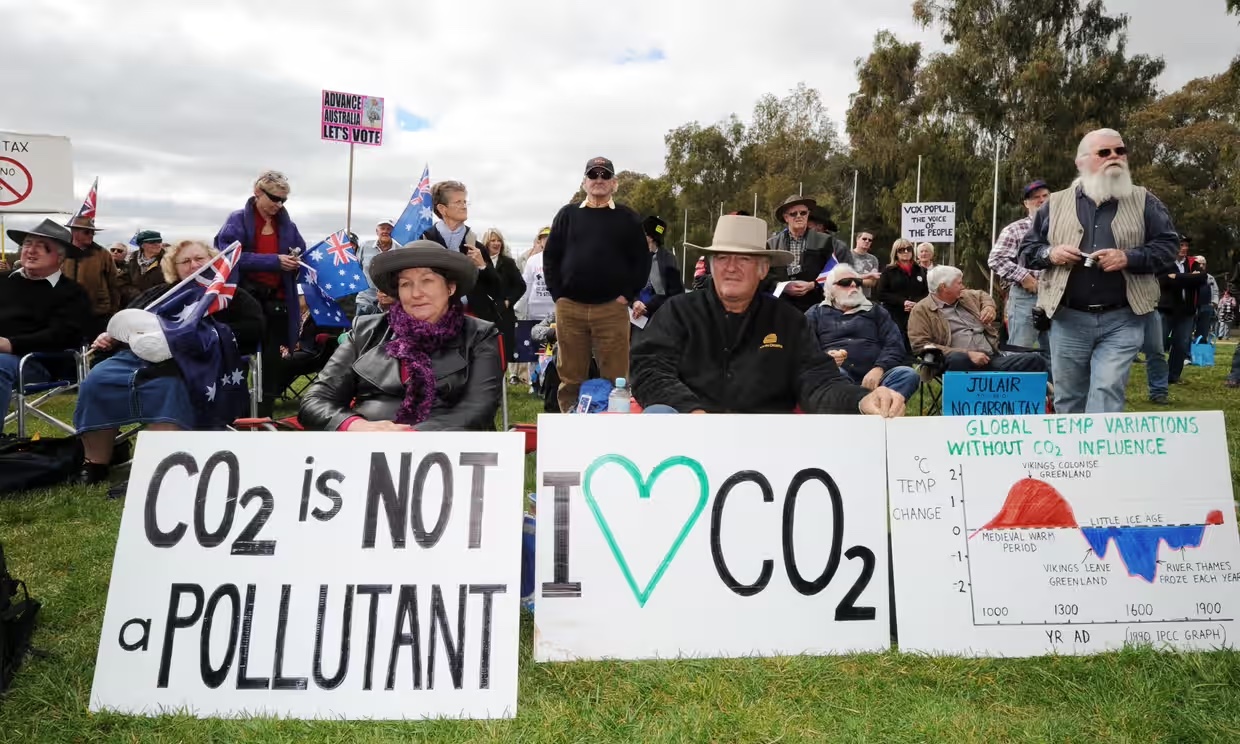“Drill baby drill.” “The Green New Scam.” “It’s freezing in New York—where the hell is global warming?”
It’s nearly impossible to feel like there is any hope left for the environment when the next President of the United States has effectively denied the existence of climate change. As an undergraduate student studying climate change and its effects on society, the impact of these words is heart-wrenching. Why dedicate my life to addressing a problem that my government won’t even acknowledged is real?
Maybe I shouldn’t be so surprised. Climate denialism is nothing new. It is the idea that climate change is not real, and that the world does not need to shift our approach towards the environment and phase out fossil fuels. However, it has adapted over the years. It started as mostly broad claims of “climate change is not happening,” then morphed into “climate change is happening but humans are not driving it.” Now we have entered the narrative that climate change is happening but it is nothing to worry about.
Denial is not without incentive—it is an extremely economically profitable claim. In economic terms, climate change can be understood as an economic externality, meaning that companies are not paying the price for the harm their carbon emissions do to society. To get away with this money-saving shortcut, companies have had to deny that climate change is an externality. A coalition of members in the fossil fuel industry, including trade associations and conservative philanthropists, have shaped the way the public views climate change in order to execute this scheme
Fossil fuel companies are very sneaky. Perhaps the sneakiest is ExxonMobil. In 2021, a recording of Keith McCoy, a senior director in Exxon’s Washington government affairs team, revealed that the company supports a carbon tax “as an easy talking point” and an “advocacy tool.” “Nobody is going to propose a tax on all Americans, and the cynical side of me says, yeah, we kind of know that–but it gives us a talking point that we can say, well, what is ExxonMobil for? Well, we’re for a carbon tax,” he said. This play by Exxon is admittedly smart, as passing a carbon tax through Congress would be quite the challenge. As of March 2024, the House of Representatives passed Resolution 86, which in simple terms is a bipartisan rejection of a potential carbon tax. This is not surprising, as 123 elected officials (23% of the 118th Congress) are climate deniers.
Current-day Exxon appears to have had a change of heart. The Exxon CEO has now admitted they do not support a carbon tax and has even come to the defense of the biggest climate legislation in history, the Inflation Reduction Act. It has also come out against the United States pulling out of the Paris Agreement. This seems like a positive change, right?
However, the motives may not be so pure. Exxon is simply adjusting their strategy. Outright climate denial is not broadly popular; Americans who think global warming is happening outnumber those who think it is not happening by a ratio of about 5 to 1 (70%). Instead, Exxon is pushing the development of carbon capture and storage (CCS) technology. This technology will allegedly solve climate change by removing carbon from the atmosphere and storing it without necessitating the shift to renewable energy. But CCS is lackluster at best. According to the Intergovernmental Panel on Climate Change (IPCC), CCS at its full planned potential will account for 2.4% of CO2 mitigation by 2030.
But CCS is not working at capacity. Not only are projects failing on a global scale, but the technology itself fails to reduce emissions when oil and gas are burned by the consumer (such as burning gas from driving other heating homes), which represents 85%-90% of total emissions. To add insult to injury, about three-quarters of CCS projects are engaged in enhanced oil recovery, which creates more emissions, negating the initial reduction. CCS pales in comparison to other sustainable alternatives. Renewables, efficiency, electrification, and reducing fugitive methane emissions can address more than 80% of the world’s decarbonization needs by 2030, according to the International Energy Agency (IEA) and IPCC.
The fossil fuel companies alone are not single-handedly fighting against climate change solutions. Conservative think tanks and misinformation have been key actors in promoting climate denial since the 1990s. The Marshall Institute was one of the first conservative think tanks to focus on climate denial. The scientific achievements of its founders (in physics, not climate science) led its denial of anthropogenic climate change to have a significant impact in D.C. and on the press. In 2015, the Marshall Institute had trouble receiving funding due to this stance on the climate and rebranded as the CO2 Coalition. Now they advocate for the positive effects of carbon dioxide on the economy, while still undercutting the severity of climate change.
Sure, people can write what they want, but how do we know this has impacted the politics of the American mind? Climate deniers have used a multitude of political tactics to shape public discourse. A prime example of how politics has substantiated the climate denial movement is the parallels drawn between Michael Mann and Hilary Clinton. Climate deniers set up a conference organized by the Heartland Institute in 2010 where they chanted “Lock Him Up!” and customized hockey sticks to say “Mann-Made Global Warming”, as jabs to climatologist Michael Mann’s “hockey stick” projection of climate change. This same slogan came back as “Lock Her Up!” in reference to Hilary Clinton. This example indicates how environmental movements seep into politics, and may even demonstrate that the individuals fueling climate denial in the political sphere are not even about climate change, but about a broader political agenda.
The lengths to which companies and think tanks will go to trick people is disheartening. Is it time to throw in the towel? Have we lost this fight?
These questions encapsulate a new threat to climate change mitigation: climate doomerism. Climate doomism is the idea that climate change is inevitable and there is nothing we can do to stop it. We should give up the fight and accept our fate. The real threat of doomism is that it is not only a weapon of climate denialism, but can impact the will of those who want to fight climate change.
A survey from The Lancet of 10,000 children and young adults (aged 16–25 years) in ten countries (Australia, Brazil, Finland, France, India, Nigeria, Philippines, Portugal, the UK, and the USA; 1000 participants per country) discovered that 55.7% of participants felt as if humanity was doomed and 75% of participants said the future was frightening. A certain level of concern for the climate is good, but these feelings of absolute despair raise red flags. If we accept doom, we will lose the will to make changes.
To give a vote of confidence–we are not doomed. There is much to be hopeful about. The prices of solar power, wind power, and low-carbon energy batteries are rapidly declining. Global deforestation rates, sales of new gas and diesel cars, and the use of coal are all falling. In other words, the world is moving towards limiting global warming to 2 degrees.
Every increment of warming matters. The International Panel on Climate Change has been clear that each decimal of a degree of warming causes rapidly escalating hazards. Extreme heat and food insecurity—even pandemics and regional conflicts—will become harder to contain. Every action to mitigate climate change will have immense benefits for uniquely vulnerable populations and society as a whole.
So there is a climate fight to be won, but how do we fight the overwhelming sense of doom? As with most things in life, the answer is moderation. A moderate sense of impending doom is necessary to fuel the fire to fight for change. Too little doom leads to complacency and too much doom leads to inaction. This begs us to ask how much of the reality of climate change we can accept.
There are a few arguments against thinking of climate change as a catastrophic problem, including misrepresenting science, distracting practical solutions, and creating counterproductive policies. Many news publications and scientific journals have analyzed catastrophic climate scenarios without misrepresenting science or detracting from decarbonization efforts. A lack of effective risk assessment could hinder realistic policy planning.
A study of climate change anxiety and hope revealed that climate anxiety is positively connected with climate action, which shows the value of climate anxiety as an adaptive response. This aligns with the broader scholarly consensus. This study also shows a positive connection between hope and climate action (there are some contradicting studies but this is mostly based on how hope is defined and measured). As hope increased in strength and frequency, so did climate action. Participants self-assessed that hope (80%) increased their climate actions more than anxiety (57%).
The most recent meta-analysis concludes that fear-based messaging is effective at changing intentions, attitudes, and behaviors toward climate change. It also concluded that there were no observed situations which made it counterproductive for climate efforts.
This begs the question of nuance. The line between optimism and reality in doom is incredibly thin. This is not just true for climate issues but pandemic preparedness, foreign policy issues, and domestic polarization, all make the world feel impossible to navigate. My best advice: stay educated, stay worried, and stay hopeful.
Featured Image: The Guardian






Comments are closed.